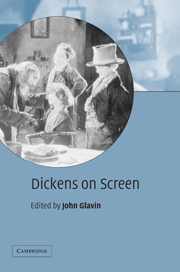Book contents
- Frontmatter
- Contents
- List of illustrations
- Notes on the contributors
- Acknowledgments
- Introduction
- Part I
- Part II
- Part III
- Part IV
- 11 Cinematic Dickens and uncinematic words
- 12 Dickens, Eisenstein, film
- 13 Orson Welles and Charles Dickens 1938–1941
- 14 David Copperfield (1935) and the US curriculum
- 15 Dickens, Selznick, and Southpark
- 16 Tiny Tim on screen: a disability studies perspective
- Part V
- Index
- References
12 - Dickens, Eisenstein, film
Published online by Cambridge University Press: 22 September 2009
- Frontmatter
- Contents
- List of illustrations
- Notes on the contributors
- Acknowledgments
- Introduction
- Part I
- Part II
- Part III
- Part IV
- 11 Cinematic Dickens and uncinematic words
- 12 Dickens, Eisenstein, film
- 13 Orson Welles and Charles Dickens 1938–1941
- 14 David Copperfield (1935) and the US curriculum
- 15 Dickens, Selznick, and Southpark
- 16 Tiny Tim on screen: a disability studies perspective
- Part V
- Index
- References
Summary
Dickens was born for film. That's the truism. The further truth that film was born from Dickens is the burden of the most famous genealogical essay in the literature of cinema, by the renowned Soviet director and theorist Sergei Eisenstein. The accomplishment of that essay, and certain motivated blind spots in its attention, is the topic of this one. Though never thinking to film a Dickens novel, Eisenstein understood the cinematic strategies – if not the deeper logic – of the novelist's construction as never before. His observations offer an endlessly fertile point of departure for what I would call a filmic grasp of Dickensian prose.
The trouble comes mostly with filmed Dickens. What movies repeatedly ignore in his writing, as they milk locations for his “atmosphere” and dial up his dialogue, is exactly the shared basis of the two media, film and prose fiction: their common reliance on the very dynamo of narration. This is the structural engineering of storytelling itself, operating in Dickens's prose from the level of syllable and word to sentence and paragraph. In stylistic matters, adaptation is usually the graveyard of appreciation. Occasional screen exceptions, to which we will come round in the end, only cement that general verdict by contrast. For what Dickens secretly willed to film is exactly what no copyright could ever have protected: a whole new mode of kinetic sequencing in which juxtaposition is submitted to continual resynthesis.
- Type
- Chapter
- Information
- Dickens on Screen , pp. 122 - 144Publisher: Cambridge University PressPrint publication year: 2003
References
- 3
- Cited by

